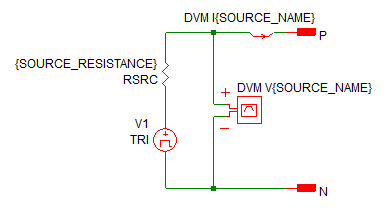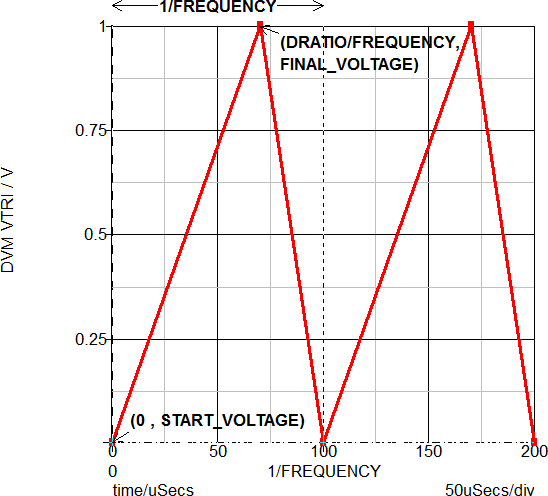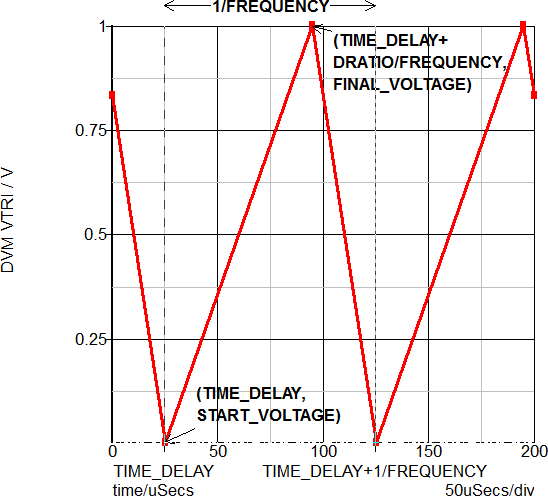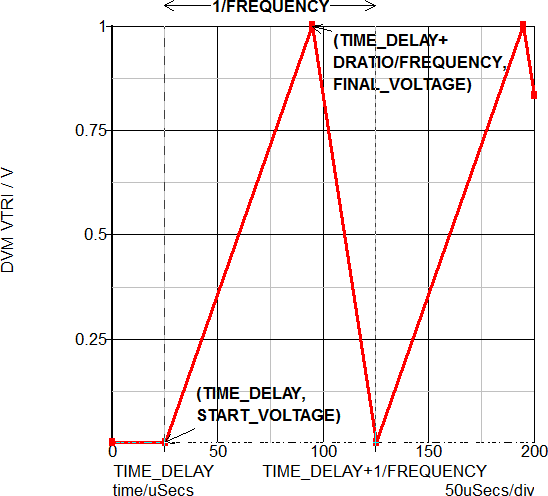DVM - Design Verification Module
|
The Triangle Waveform Source subcircuit models a repeating triangle waveform source. This source is not used in any test objectives, but you can set a source to use this subcircuit with a Tri() call in the Source column of your testplan.
Other similar pulsed voltage sources include:
In this Topic Hide
Model Name |
Triangle Waveform Source |
|
Simulator |
|
This device is compatible with both the SIMetrix and SIMPLIS simulators. |
Parts Selector |
|
|
Symbol Library |
None - the symbol is automatically generated when placed or edited. |
|
Model File |
SIMPLIS_DVM_ADVANCED.lb |
|
| Subcircuit Name |
|
|
| Symbols |  |
|
| Schematic |  |
|
The following table explains the relevant parameters.
| Parameter Name | Default | Data Type | Range | Units | Parameter Description |
DRATIO |
0.5 |
Real |
0 to 1 |
The duty cycle ratio for the triangle waveform source | |
FINAL_VOLTAGE |
750m |
Real |
V | The peak or maximum voltage for the triangle waveform source. This can be a numeric value or a symbolic value, such as a percentage of nominal input voltage. | |
FREQUENCY |
10k |
Real |
min: > 0 | Hz | The frequency of the source pulse |
IDLE_IN_POP |
0 |
Real |
0 or 1 | If set to 0, the source voltage during the POP analysis is set to the START_VOLTAGE; otherwise the source will be active during the POP analysis. | |
SOURCE_NAME |
SRC |
String |
n/a |
n/a |
Name of the DVM source. This name cannot contain spaces. |
OFF_UNTIL_DELAY |
0 |
Real |
0 or 1 | If set to 1, the source voltage will be the START_VOLTAGE until the time specified by TIME_DELAY. If set to 0, the value of TIME_DELAY is interpreted as a phase delay. | |
PHASE_ANGLE |
90 |
Real |
° | The phase angle of the triangle waveform, used only if the USE_PHASE parameter is 1. | |
START_VOLTAGE |
0 |
Real |
V | The valley or starting voltage for the triangle waveform source. This can be a numeric value or a symbolic value, such as a percentage of nominal input voltage. | |
TIME_DELAY |
10u |
Real |
min: 0 | s | The delay before the source voltage pulse starts. The source behavior before the TIME_DELAY is determined by the OFF_UNTIL_DELAY parameter. |
USE_PHASE |
0 |
Real |
0 or 1 | If set to 1, the source is configured to use the phase angle supplied by the PHASE_ANGLE parameter. |
To set any managed DVM source to a Triangle Waveform Source subcircuit, place a Tri() testplan entry in the Source column.
The Tri() testplan entry has the following syntax with the arguments taken from the list of parameters above.
Tri(REF, START_VOLTAGE, FINAL_VOLTAGE,
FREQUENCY, DRATIO)
Tri(REF, START_VOLTAGE,
FINAL_VOLTAGE, FREQUENCY, DRATIO, OPTIONAL_PARAMETER_STRING)
| Argument | Range | Description |
REF |
n/a |
The actual reference designator of the DVM source or the more generic syntax of INPUT:n where n is an integer indicating a position in the list of managed DVM sources. |
| START_VOLTAGE | n/a | The valley or starting voltage for the triangle waveform source. This can be a numeric value or a symbolic value, such as a percentage of nominal input voltage. |
| FINAL_VOLTAGE | n/a | The peak or maximum voltage for the triangle waveform source. This can be a numeric value or a symbolic value, such as a percentage of nominal input voltage. |
| FREQUENCY | min: > 0 | The frequency of the triangle waveform source |
DRATIO |
0 to 1 | The duty ratio of the source |
| OPTIONAL_PARAMETER_STRING | n/a |
Parameter string with any of the other parameters from the parameter table above* |
* If multiple parameters are specified, join the parameter key-value pairs with a space, as shown in the examples below. The order of the parameter names does not matter.
The following examples set the first DVM managed source to a Triangle Waveform Source with a starting voltage of 0V and a final voltage of 1V. The timing parameters and the optional parameter strings are different for each example.
Note: In all of the examples below, the Source column is the first column in the testplan and, therefore, begins with the special three character sequence: *?@.
Since the TIME_DELAY parameter is set to zero, the triangle wave begins with a START_VOLTAGE value of 0 at t=0.
| *?@ Source | ||||
|---|---|---|---|---|
| Tri(INPUT:1, 0, 1, 10k, 0.70, TIME_DELAY=0) | ||||
The results of this testplan entry are shown below:

In this example, the TIME_DELAY parameter is set to 25us. Since the OFF_UNTIL_DELAY parameter is not specified, the TIME_DELAY is interpreted as a phase delay.
| *?@ Source | ||||
|---|---|---|---|---|
| Tri(INPUT:1, 0, 1, 10k, 0.70, TIME_DELAY=25u) | ||||
The results of this testplan entry are shown below:

In this example, the TIME_DELAY parameter is set to 25us, and the OFF_UNTIL_DELAY is set to 1; therefore, for simulation times less than the TIME_DELAY parameter, the source voltage is 0V, which is the value of the START_VOLTAGE argument.
| *?@ Source | ||||
|---|---|---|---|---|
| Tri(INPUT:1, 0, 1, 10k, 0.70, TIME_DELAY=25u OFF_UNTIL_DELAY=1) | ||||
The results of this testplan entry are shown below:

© 2015 simplistechnologies.com | All Rights Reserved